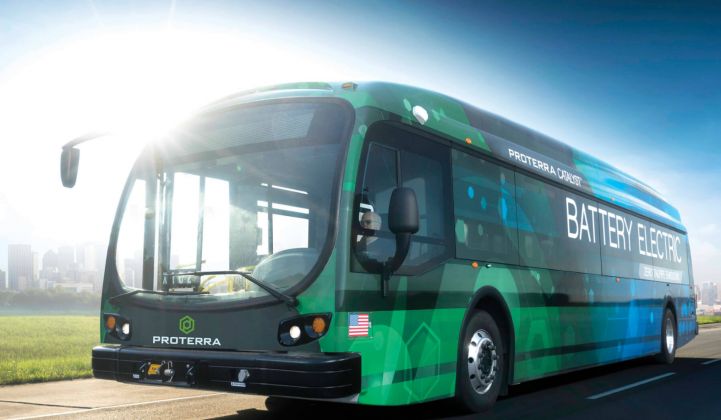Electric busmaker Proterra closed a $55 million funding round with new investors BMW i Ventures and Al Gore's Generation Investment Management.
The company raised a $140 million Series E just six months ago to build a second EV bus factory, now up and running in Los Angeles. The latest round is smaller, at $55 million, with the primary goal of forging new strategic alliances, said VP of Finance and Strategy Toby Kraus.
"Series 5 was an exciting milestone," said Kraus in an interview. "There was still such a high level of demand for Proterra from an investment standpoint that we thought it would be in our best interest to take on a bit more capital, particularly if the investor was a very strategic partner for us."
The two publicly announced investors fit that description.
The venture arm of BMW connects the bus startup with one of the major incumbent automakers pursuing electrification. BMW's approach of building lightweight carbon-fiber chassis and custom-designed battery packs mirrors Proterra's approach to buses. BMW has also been a leading innovator on second-life batteries, and has deployed them for stationary storage after use in vehicles.
The i Ventures unit opened in 2011 with €100 million ($112,175,000) to invest in mobility and mobility services. It has since expanded in funding and scope. This Proterra round marks the first direct EV investment for the firm.
"We have a [bus] market that’s dominated by integrators that have historically built products in which they have limited IP -- major components were procured rather than being developed internally," said Zach Barasz, partner at BMW i Ventures. "One of the things we liked about Proterra is they were developing that IP and had their own in-house battery team, they had their own drivetrain technology, they had their own bus body technology."
The investment is independent of any commercial partnerships that might form in the future, Barasz noted. That said, he sees significant overlapping interests between Proterra and BMW, like charging infrastructure and lightweight composite chassis designs, that could become areas of collaboration.
Generation Investment Management manages around $17 billion and carries the clout of Al Gore, one of the most prominent public figures in the climate change arena. His firm stands as one of the leading sustainably minded investment companies, and has posted tremendous profit numbers for its high-value clients.
The Atlantic's James Fallows profiled the company in 2015 and found that Generation's average returns ranked second in a survey of 200 global-equity managers.
"Over the past decade, they have made more money, in the Darwinian competition of international finance, by applying an environmentally conscious model of 'sustainable' investing than have most fund managers who were guided by a straight-ahead pursuit of profit at any environmental or social price," Fallows wrote.
Generation had been following Proterra for some time, said Colin le Duc, co-head of Growth Equity. Falling costs for the buses, plus new customer wins and executive and board member additions since the last funding round, convinced him the time was right.
Besides the money and possibility of long-term capital partnership, Generation brings 15 years of developing relationships with cities and companies worldwide that are interested in sustainability.
There is a very good investment case just on beating out the incumbents in the U.S. bus market, le Duc said. But that's not all Proterra offers.
"Proterra is, on the face of it, selling buses, but the real magic is the battery system," he said.
Tesla managed to surpass Ford's market cap having sold a fraction of the cars, in part because investors value the potential of its electric drivetrain technology, le Duc said. Proterra offers a similar value for the bus market.
Since the January funding round, Proterra launched operations at the L.A. factory, which joined the existing facility in Greenville, South Carolina. They each can produce two buses per week operating on a single shift, Kraus said. With modifications to the line and a second shift, they could scale to several hundred a year.
The company now assembles its battery packs at a highly automated manufacturing line in Burlingame.
Customers have ordered 118 vehicles this year, Kraus said, and Proterra has put a cumulative 110 vehicles on the road. King County, Washington purchased 73 from Proterra in January.
"We have a backlog to keep us busy through 2018," Kraus said, adding that a year or two of backlog is typical in this industry. "Our balance is always making sure that we’re scaling production sufficiently, because we don't want the backlog to get too long. [...]We want to make sure a customer doesn't have to go to an inferior product."
The company is well poised to capitalize on the surge in local actions that followed President Donald Trump's decision to pull out of the Paris Agreement on climate change. Local decisions to electrify the bus fleet will create new customers for Proterra.
Proterra CEO Ryan Popple has said that EV buses will have a lock on all new bus procurements by 2030. The company's steady growth could lead to an IPO; Popple had said the previous funding round could be a pre-IPO round. But he hasn't had trouble attracting more funding ahead of going public.
"They’ve got plenty of capital to control their own destiny for many years now," le Duc said. "That’s a good place to be."
What's Proterra's vision for the future of buses? Listen to CEO Ryan Popple on The Energy Gang podcast describing the economic case for electrifying bus fleets.



